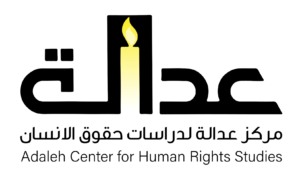
The Legal Aid Unit at the Adaleh Center for Human Rights Studies is a specialized unit that provides free legal assistance to marginalized and disadvantaged groups, including Syrian refugees, migrant workers, domestic workers, and victims of torture. The Unit is committed to playing its role in promoting human rights and the rule of law in society, in line with international human rights standards. It also strives to expand its activities and programs, offering high-quality legal and social services to marginalized and disadvantaged groups.
The Unit aims to promote human rights and the rule of law by providing the following legal services:
Legal Protection: Offering beneficiaries legal protection through legal counseling and representation in judicial or administrative cases.
Legal Development: Enhancing beneficiaries’ legal awareness by delivering training courses and lectures on human rights and the law.
Social Development: Supporting beneficiaries’ social well-being by providing psychological and social support services.
The Legal Aid Unit plays an important role in promoting human rights and the rule of law in society, as it helps protect marginalized and disadvantaged groups from legal violations and social injustice. The following examples illustrate the importance of the Unit’s work:
Protection of Syrian Refugees’ Rights: The Unit helps safeguard the rights of Syrian refugees by providing legal guidance and practical solutions to address their legal situations.
Protection of Migrant and Domestic Workers’ Rights: The Unit supports migrant and domestic workers in securing their labor rights, contracts, and social security entitlements.
Reparation for Survivors and Victims of Torture: The Unit assists survivors and victims of torture by offering both legal and psychological support to help them obtain redress.
The Legal Aid Unit implements a range of Procedures to achieve its objectives, as outlined below:
Legal Protection
Legal Development
Social Development
Looking ahead, the Legal Aid Unit at the Adaleh Center for Human Rights Studies seeks to evolve with greater flexibility and responsiveness to modern challenges. This includes the use of technology, data analysis, engagement with the private sector, and active community participation to ensure the achievement of its goals. Planned steps include:
The Legal Aid Unit conducts regular evaluations of its services to ensure the achievement of its objectives and to improve performance. To this end, it employs a set of practical measurement methods and tools within the Unit’s available resources, including financial and human capacities, as follows:
The Legal Aid Unit focuses on groups that face difficulties in accessing legal services, particularly marginalized and disadvantaged populations, to ensure the achievement of its objectives in promoting human rights and the rule of law in society. The primary target groups include:
In its future programs, the Unit aims to expand its reach to other marginalized and disadvantaged groups, including:
The Legal Aid Unit at the Adaleh Center for Human Rights Studies consists of three main programs:
Legal Aid Program for Syrian Refugees: This program provides legal assistance to Syrian refugees across all legal areas, including residency, asylum, labor, marriage, education, and healthcare.
Legal Aid Program for Migrant and Domestic Workers: This program offers legal support to migrant and domestic workers in all relevant legal matters, including labor rights, contracts, and social security.
Legal and Psychological Aid Program for Survivors and Victims of Torture and Their Families: This program provides both legal and psychological assistance to survivors of torture and their families, including reparations, healthcare, and psychosocial support.

The Adaleh Center for Human Rights Studies was established in 2003 by Jordanian human rights activists as a non-governmental, non-profit organization that operates with political neutrality and seeks to promote human rights values in Jordan and the Arab world.
Email : info@adaleh-center.org
Phone Number (06) 560 2371
Address:
Tla’a Alali-Almawrdy street -building no.4-first floor , Amman, Jordan
All rights reserved ⓒ Justice Center for Human Rights Studies || Designed and Developed by Portal Company